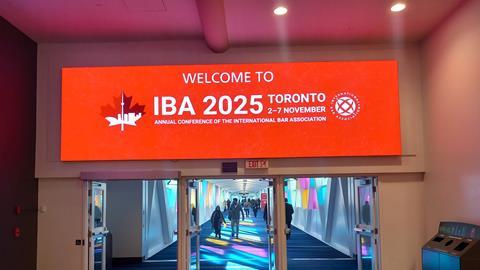This week’s IBA conference was consumed by the revolutionary implications of artificial intelligence. Seventeen breakout sessions were devoted to the topic, ranging from working practices to billing.
Perhaps the most brutal riposte at the International Bar Association conference this week came when a lawyer, who one might describe as a boomer, admitted he still struggled to use email, let along plug into artificial intelligence.
‘Lawyers who don’t understand this stuff will be deleted,’ came the curt response from the podium. ‘There’s simply no excuse for not trying. When you get in an elevator do you wait for it to go? No, you push the button yourself.’
An audience member bewildered at the pace of change while an expert told him to just do something captured the mood of much of the week in Toronto.
Aside from the Trump administration (on which there was much discussion), the only topic on most people’s lips was AI. No subject was safe from its clutches – be it access to justice, human rights, legal ethics or law firm profitability. A remarkable 17 breakout sessions were given over to the topic over the course of four days.
Asked to name the biggest factor shaping their short-term thinking, law firms surveyed by the IBA gave training staff in AI as the most frequent answer. (This ranked second when the same survey was carried out last year.) Finding the right technology and client expectations regarding AI appeared in the top five for the first time.
'This is a wake-up call to secure your firm’s future. The AI revolution is here and you are already behind. The unregulated sector is coming to eat your lunch'
Itzik Amiel, IBA Future of Legal Services Commission
Attracting and retaining talent dropped from first to third, while wellbeing and the drive for diversity in the profession sank to seventh and 10th, respectively.
The upshot? The profession is now permanently engaged with AI, relegating issues that were very recently regarded as important to mere afterthoughts.
Itzik Amiel, from the IBA’s Future of Legal Services Commission, warned that firms not taking AI seriously are doomed to fail – particularly as the survey also found that most firms reported not being ready to deal with this challenge.
‘It is a wake-up call to secure your firm’s future. The AI revolution is here and you are already behind. The unregulated sector is coming to eat your lunch and legal tech specialists and AI platforms are growing rapidly.’
Laura Cameron, managing partner of international firm Pinsent Masons, brought a welcome note of optimism, stating that investment in technology had already brought significant increases in efficiency. But the landscape changes so rapidly that long-term strategies are now considered over three years rather than five.
One effect, Cameron said, has been to breathe new life into the much-maligned billable hour. ‘There has been a shift: lawyers used to love the billable hour and clients didn’t, but now the clients like it more because we are putting fewer hours on the clock as we are doing things more efficiently.’ But she added: ‘Some clients don’t want us to use AI and are very clear about that. Others are pushing hard, asking what we are going to do with it.’

The AI question is also at the forefront of the UK government’s long-term justice thinking. Invited to speak about ethics, justice minister Sarah Sackman (pictured) said the time has come to start the debate on how far AI extends into judicial decision-making. She stressed that empathy and human understanding will always be essential features of the justice system, but some tasks may be more suited to automation.
‘There is no reason why AI should not assist with the drafting of contracts or researching legal questions, but looking beyond that, could AI one day calculate damages more accurately than a judge does now? Possibly. Could it adjudicate? Technically yes, but the question is not whether machines can decide or will be able to decide – because I am pretty sure they will be – but whether they should and what we might lose if they do.’
AI presents ‘extraordinary opportunities but also profound responsibilities’, she said. Done right, it could provide a justice system that is ‘faster, fairer, more accessible and perhaps even more ethical than ever before’.
Most agreed the technology would change working practices quickly and extensively. The urgent questions are how you bill for it, who you recruit to do it and what safeguards you need to put in place. One City lawyer told how a litigation client had come to him with all their documents and statements drafted with generative AI and simply wanted – and was willing to pay for – an expert to look over them. The prospect of whole swathes of law firm staff being effectively bypassed was a real one. The implications for those whose roles could be made redundant were all too apparent.
This article is now closed for comment.
































1 Reader's comment